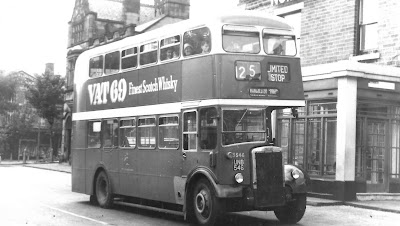Now I have no love for the trolley bus ……… and remember too many journeys where I felt ill soon after we boarded.
I think it was a combination of the quiet purr, the smell of disinfectant and seat fabric, topped off by the heat.
All of which makes me feel no compunction about citing them along with the motor bus as complicit in the killing off of the Corporation trams which for more than a half century dominated the way we travelled, in Manchester and London as well as Leeds, Newcastle and Liverpool and heaps of other places.
Here in Manchester as early as the 1920s plans were hatched to do away with the tram, and that plan took a pace during the 1930s, only slowed down by the Second World War.
The trolley bus required no rails which needed maintenance, and the bus had the flexibility that it could alter its routes unhindered by those rails or overhead cables.
I was born in the year that the last Manchester tram ran its last journey and while those in London lingered on a few more years I have no memory of being taken for a ride on one.
So, I can’t testify to how comfortable they were to travel in but judging by the public’s outburst of affection at their demise, and the continuing interest in these stately towers of transport I wish I had done at least one journey in one.
But perhaps I am surrendering to the same romantic tosh that is reserved for the steam railway locomotive.
The scheme which saw a one-way system around the city centre was dogged by traffic congestion, which both the Transport Committee and the Congestion Committee of the City Council put down to the tram car.
Sir William Davy, chairman of the Transport Committee argued that “The new scheme now appeared to be working fairly satisfactorily, but that there could be no doubt that matters would be considerably improved if they were in a position to dispense with the trams”.*
So, there you have it. I am the first to acknowledge that the economic, and traffic considerations which doomed the tram were the main reasons for their demise, leaving the bus and the trolley bus as complicit in the departure of the tram from our streets.
Pictures; Manchester Corporation Trolley Bus, 1955, m48371, courtesy of Manchester Libraries, Information and Archives, Manchester City Council, http://images.manchester.gov.uk/index.php?session=pass and Manchester Corporation Bus, 1961, Glossop, Manchester Corporation Tram, somewhere in the city, date unknown and Manchester Corporation Trolley Bus, 1961 Denton from the collection of Allan Brown
*The One-Way Route @Abolish the Trams’, the Manchester Guardian, June 15th, 1938




No comments:
Post a Comment